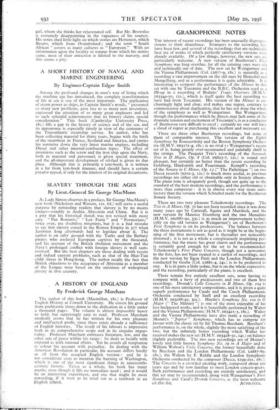GRAMOPHONE NOTES
THE interest of recent recordings has been unusually dispropor- tionate to their abundance. Strangers to the recording list, have been few, and several of the recordings that are technically best are of works of which perfectly satisfactory versions were already available. .Of a few things, however, the new sets are particularly welcome. A new version of Beethoven's Fiat Symphony was long overdue, for all the existing ones were old and technically out of date. The new set by Weingartner and the Vienna Philharmonic (Col. Lx677-9, as.) is naturally as a recording a vast improvement on the old ones by Henschel and Mengelberg, and as a performance it is quite admirable. It is interesting to compare the performance of the Minuet in this set with one by Toscanini and the B.B.C. Orchestra used as a fill-up in a recording of Brahms' Tragic Overture (H.M.V, m33349-so, 2s.), which is itself quite the best recording we have had from Toscanini. His version of the Minuet is en- chantingly light and clear, and makes one regret, contrary to commonsense about duplication, that he has not done the whole of the symphony as well as Weingartner. But Weingartner, though the performances which he directs may lack some of the dramatic tension and excitement of Toscanini's, is as a conductor of Beethoven very difficult to excel ; certainly no one will have a shred of regret at purchasing this excellent and necessary set.
There are three other Beethoven recordings, but none of them of comparable interest. The version of the Eighth Symphony by Koussevitsky and the Boston Symphony Orches- tra (H.M.V. DB3172-4, 18s.) is no rival t3 Weingartner's recent set of it, being greatly over-accentuated and painfully shrill in the strings. The Pasquier Trio's recording of the Serenade Trio in D Major, Op. 8 (Col. Dx825-7, zs.) is sound and pleasant, but certainly no better than the recent recording by Goldberg, Hindemith and Feuermann. Kempff's recording of the Sonata in C Minor, Op. 13 (" The Pathetique ") on two Decca records (x2o2-3, zs.) is much more useful, as previous recordings are either old or obtainable only in Society albums. The piano tone is adequately good, though not quite up to the standard of the best modern recordings, and the performance is more than competent : it is in almost every way more satis- factory than the version which Schnabel made for the Beethoven Sonata Society.
There are two very pleasant Tchaikowsky recordings. The Trio in A Minor, Op. 5o has not been recorded since it was done many years ago by Catterall, Squire and Murdoch, and the new version by Maurice Eisenberg and the two Menuhins (H.M.V. n132887-92, 33s.) is as much an improvement techni- cally on the old version as Weingartner's set of Beethoven's First Symphony is on its predecessors. The balance between the three instruments is not as good as it might be at the begin- ning of the first movement, but is thereafter not noticeably distorted ; it is not as a whole a conspicuously inspiriting per- formance, but the music has great charm and the performance is certainly good enough for the set to be recommended. Tchaikowsky's First Piano Concerto, though not a newcomer to the lists, has not been treated to a surfeit of recordings, and the new version by Egon Petri and the London Philharmonic conducted by Goehr (Col. Lx681-4, 24s.) is to be preferred to any. It is in parts a little sedate, but is on the whole expressive, and the recording, particularly of the piano, is excellent.
There remain five entirely excellent sets, none having to compete with a bevy of predecessors and two of them first recordings. Dvorak's Cello Concerto in B Minor, Op. 104 is one of his most satisfactory compositions, and it is given a quite superb performance by Casals and the Czech Philharmonic Orchestra conducted by Szell and an excellent recording (H.M.V. m33288-92, 3os.). Haydn's Symphony No. zoo in G Major (" The Military ") is one of the most enjoyable of his less hackneyed works, and it is beautifully performed by Walter and the Vienna Philharmonic (H.M.V. DB3421-3, 18s.). Walter and the Vienna Philharmonic have also made a recording of Mozart's " Jupiter" Symphony, which has to compete for favour with the classic set by Sir Thomas Beecham. Beecham's performance is, on the whole, slightly the more satisfying of the two, but the infinitely better recording which Walter has received makes the new set (H.M.V. m33428-31, 24s.) on balance slightly preferable. The two new recordings are of Mozart's lovely and little known Symphony No. 29 in A Major and of William Walton's Viola Concerto, the former beautifully done by Beecham and the London Philharmonic (Col. Lx687-89, as.), the Walton by F. Riddle and the London Symphony Orchestra conducted by the composer (Decca, X199-zot 18s.). The Concerto is a crowded exciting work, composed about ten years ago and by now familiar to most London concert-goers. Both performance and recording are entirely satisfactory, and this set may be recommended, along with Weingartner's First Symphony and Casal's Dvorak Concerto, as the most welcome


















































 Previous page
Previous page